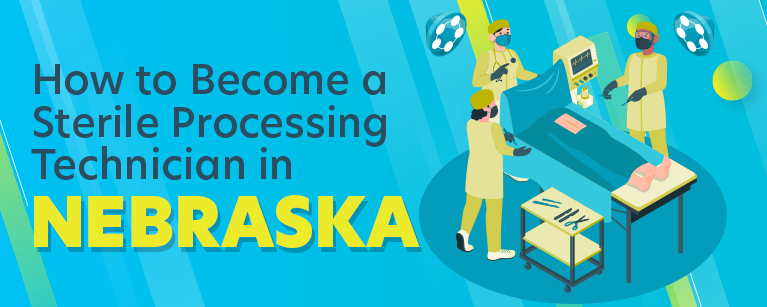
Without a sterile processing technician, the medical industry would be without its backbone.
Behind the scenes, sterile processing technicians ensure that all the tools and equipment across all sectors of the medical industry are properly cleaned and infection-free, ready for any procedures or surgeries on that day.
In this in-depth guide, we’ll walk you through the process of becoming a sterile processing technician in Nebraska.
Table of Contents
- How to Become a Sterile Processing Technician in Nebraska: A Step-by-Step Guide
- What does a sterile processing technician do?
- Licensing and Registration
- Certification
- Sterile Processing Technician Schools in Nebraska
- Sterile Processing Technician Salary
- Job Outlook
- Frequently Asked Questions
- Sterile Processing Technician Info by State
How to Become a Sterile Processing Technician in Nebraska: A Step-by-Step Guide
Your journey to become a sterile processing technician in Nebraska can start as far back as high school, preparing with the right courses.
The path to becoming a sterile processing technician might also not be the same for everyone.
High School
If you’ve decided as early as high school to go down the path of becoming a sterile processing technician, it’s beneficial to take courses that will provide the right foundation to build upon.
Taking classes in science and math is valuable, particularly biology and chemistry.
Doing any volunteer work whilst you’re in high school, whether it’s at a medical center, clinic, or aged care, can also provide a good experience and insight into the industry.
Post-Secondary Study
A formal degree might not be required in Nebraska, but many employers would prefer candidates with pre-existing knowledge and proven skills in the field.
There are various options available, including associate degree programs and certificate programs designed for Sterile Processing Technicians—sometimes referred to as Surgical Technology.
Training On The Job
While it’s rare, it is possible to be hired at a medical center or similar after high school and receive training on the job.
If you don’t live near a campus, or struggle with paying for formal training, this might be a good choice as you’re learning while being employed.
What does a sterile processing technician do?
Here are some of the duties and responsibilities of a sterile processing technician.
- Laying out the surgical gloves and gowns before medical procedures (such as surgeries)
- Sterilizing, wrapping, organizing, preparing, and ordering medical equipment and surgical instruments
- Preparing, delivering, and sterilizing instruments and equipment as necessary for medical examinations, procedures, and other staff
- Operating and monitoring sterilization equipment
- Checking and reporting any issues or problems with sterilizing equipment
- Removing and disposing of any medical waste or contaminated equipment
Licensing and Registration
Unlike other professions in the healthcare industry, there is no license or registration process for sterile processing technicians.
Certification
While certification isn’t mandatory for sterile processing workers in Nebraska, it looks great on your resume and better for prospective employers.
Obtaining certification shows that you possess the necessary knowledge, skills, and experience to perform the job effectively.
Depending on the facility, it might be required by the employer.
The Healthcare Sterile Processing Association (HSPA) is the most widely recognized and known certification for sterile processing workers.
It is accredited by both the ANSI National Accreditation Board (ANAB) and the National Commission for Certifying Agencies (NCCA).
To obtain a CRCST status from the Healthcare Sterile Processing Association, applicants must pass their certification exam, as well as complete 400 hours of hands-on experience within 6 months of passing the exam.
If you’re looking to study a post-secondary program for sterile processing or surgical technology, the certification process is sometimes included as part of the study progress.
Sterile Processing Technician Schools in Nebraska
Nebraska Methodist College
- Location: Omaha, Nebraska
- Expected Time To Complete: 6 Weeks
- Estimated Course Cost: $780
This short sterile processing technician certificate program at NMC is perfect if you want to peek into the medical world.
It’s a great entry point into the world of sterile processing and surgical technology.
Successful students also have the opportunity to become eligible for the Sterile Processing Technician exam through the Certification Board for Sterile Processing & Distribution (CBSPD).
Southeast Community College
- Location: Lincoln, Nebraska
- GAP Assistance Available
SECC provides a sterile processing technician course to people aged 16 and up.
It’s designed to prepare you for an entry-level job in the field and prepare you for the certification.
| School Name | Address |
|---|---|
| Nebraska Methodist College | 720 N 87th St, Omaha, NE 68114, United States |
| Southeast Community College | 8800 O St, Lincoln, NE 68520, United States |
Sterile Processing Technician Salary
The average base pay for a sterile processing technician in Nebraska is $42,526 a year.
This is better than some other states, where the salary is closer to $35,000-37,000.
Salary will also depend on your formal qualifications, with an Associate Degree being more valuable and certifications.
Job Outlook
The healthcare industry as a whole is always good to invest in and a great career opportunity.
Sterile processing technicians specifically are also high in demand, and estimated to grow at least 6.3% over the next 10 years, according to an article from Oklahoma State University.
Annual Salary Range:| Location | Avg. Annual Salary |
|---|---|
| Omaha | $42,849 |
| Lincoln | $42,471 |
| Bellevue | $42,849 |
| Grand Island | $41,882 |
| Kearney | $41,882 |
| Fremont | $42,169 |
| Hastings | $41,882 |
| North Platte | $41,094 |
| Norfolk | $38,936 |
| Columbus | $41,882 |
Regional Salary in Nebraska
| Region | Employed | Avg. Annual Salary | Avg. Hourly Pay | Top 10% Annual Salary | Bottom 10% Annual Salary |
|---|---|---|---|---|---|
| Lincoln, NE | 100 | $38,590 | $18.55 | $39,000 | $36,130 |
| Omaha-Council Bluffs, NE-IA | 340 | $38,920 | $18.71 | $46,220 | $31,730 |
* Employment conditions in your area may vary.
Frequently Asked Questions
Are you required to be vaccinated to work as a sterile processing technician?
Yes.
As with other roles in the healthcare industry, you must be vaccinated and immunized for a range of diseases to protect yourself and others.
If you’re not sure what immunizations or vaccinations are required for the course, you can get in touch and ask your school or employer.
Do you need to be licensed to work as a sterile processing technician in Nebraska?
No.
Unlike other healthcare professions, sterile processing technicians don’t require licenses or registration in Nebraska.
However, you can optionally get certified, which can increase your chances of getting a job.
What are some types of companies or organizations can a sterile processing technician work for in Nebraska?
Sterile processing technicians can work across all sectors of the healthcare industry in Nebraska.
Their job is handling, cleaning, disinfecting, and organizing equipment and tools.
From surgeries to physicians, medical centers, aged care, and even dental—they can work anywhere in the industry.
Sterile Processing Technician Info by State
- Alabama
- Alaska
- Arizona
- Arkansas
- California
- Colorado
- Connecticut
- Delaware
- Florida
- Georgia
- Hawaii
- Idaho
- Illinois
- Indiana
- Iowa
- Kansas
- Kentucky
- Louisiana
- Maine
- Maryland
- Massachusetts
- Michigan
- Minnesota
- Mississippi
- Missouri
- Montana
- Nebraska
- Nevada
- New Hampshire
- New Jersey
- New Mexico
- New York
- North Carolina
- North Dakota
- Ohio
- Oklahoma
- Oregon
- Pennsylvania
- Rhode Island
- South Carolina
- South Dakota
- Tennessee
- Texas
- Utah
- Vermont
- Virginia
- Washington
- West Virginia
- Wisconsin
- Wyoming









